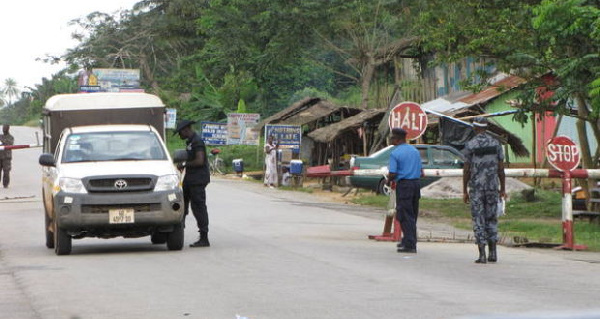Head of Freight and Logistics Department of the Ghana Shippers Authority (GSA), Mr Fred Asiedu Dartey has said the Ghana Police service is an important element of trade facilitation and must execute its role without hindering flow of commerce. He urged the Police to help promote the growth of the nation’s transit trade sector for a holistic economic development.
Speaking at a sensitisation workshop organised by the Authority for Police officers as part of series of programmes to improve the nation’s trade corridors, Mr. Asiedu Dartey acknowledged the multiplicity of Police checkpoints and its impact on transit trade facilitation.
Mr Dartey said Ghana continues to lose its share of transit patronage by landlocked neighbours, and that a study of the situation revealed the availability of the many Police checks on the highways.
He said the Police accounted for 80 per cent of harassment on the roads, and that long delays of vehicles, and the prevalent extortion at checkpoints discouraged international movers.
Traders are now switching to ports in Togo, Ivory Coast and other favourable destinations within the sub region, he hinted.
The Head of Department said transit trade remained a lucrative sector for the Government, worth an annual contribution of tens of millions of dollars to the economy, and needed to be sustained.
He counted the existence of 63 checkpoints on the line from the port of Tema to the community of Hamele on the border with Burkina Faso, and a total 53 from Tema to Paga, and said although it was justified for the Police to maintain such structure for the corridors, it should not impede the flow of trade.
“We need to do something. Drivers spend 1 to 3 hours at checkpoints over petty issues, and extortion is affecting the patronage of Ghana’s ports. The police should not sell the birthright of the nation for a pittance on the corridors,” Mr. Dartey stated.
Other impediments to the transit corridors highlighted included taxes in services, nuisance middlemen, and delays at border crossings.
Language barriers, demurrage charges, and banking challenges were also brought up as impediments.
Police officers were reminded of the volatility of international trade, and therefore urged to work with appropriate agencies in ensuring due processes in handling various situations.
“Trade facilitation is very crucial and transit trade is key. We should not impede the development of transit trade because it will affect the prospects for the development of the nation’s ports,” Mr Dartey said.
Ms Benonita Bismarck, Chief Executive Officer of the Ghana Shippers Authority, said in an address that transit trade facilitation aligned with the aspirations of the AfCFTA, and would continue to be championed by the Authority.
“Contrary to the widely held perception that Ghana does not derive any benefits from the transit trade through its corridors, the outcome of a study in 2015 showed that tangible financial benefits accrued to operators along the transit value chain,” she said.
As part efforts to promote the sector, the Shippers Authority had signed an MoU with landlocked countries to boost the needed collaboration.
Land had also been acquired in the Central Region of Ghana for the construction of a freight park and one stop complex that would be replicated along all major corridors.
The Chief Executive was hopeful the engagements would benefit the growth of transit trade and said stakeholders should work towards boosting that.









![Ayra Starr unveils her own dolls [VIDEO]](https://mx24online.com/wp-content/uploads/2024/07/132420163_4.ceremonialcapdenkyemkyetrusteesofthebritishmuseum-100x75.webp)